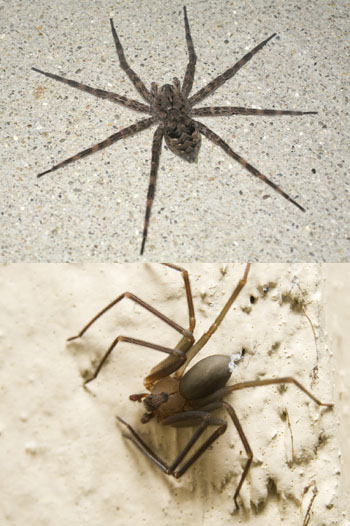The story flooded my Facebook feed: A house in Missouri was infested with 5,000 brown recluse spiders. More than one of my friends said they’d just burn that house down if it was theirs.

Brown recluses have long been a source of terror and urban legend. Mention them to a group, and chances are someone will claim to know someone who’s been bitten, maybe lost a hand or maybe even died.
I’m not immune to the hype: I scrutinize the small spiders that come into my house every fall with the same fervor as someone hoping to prove the existence of Bigfoot.
But they never appear venomous. When I tried to identify the small brown spider I saw the other day, a Google Image search revealed that it was, most likely, a wolf spider.
It turns out I was lucky I hadn’t been bitten. “They certainly hurt,” says toxicologist Christopher Holstege, MD. He suspects some rumored brown recluse bites actually came from the wolf spider. Those bites cause a lot of pain, but they won’t lead to serious problems.
Brown Recluses in Virginia
A lot of people claim they’ve seen brown recluses in Virginia, although the spiders aren’t common here. They’re “more common in the popular press than in real life,” the Virginia Tech Department of Entomology notes. Penn State College of Agriculture says the recluse is established in 15 states; Virginia isn’t one of them.
That doesn’t mean they’re not here: They’re established in neighboring Tennessee, and they can end up in moving boxes and suitcases.
However, Holstege is the co-medical director of UVA’s Blue Ridge Poison Center, which serves a large portion of Virginia, including the southwest tip along the Tennessee border. A large chunk of the Poison Center’s calls are medication mistakes and exposure to household toxins; their doctors have never seen a brown recluse bite. Some people suspect a bite when they develop lesions, Holstege says, but the true cause is always something else.
What do we have in Virginia? Deer ticks. Virginia had 925 confirmed cases of Lyme disease in 2013. As Holstege points out, “Spiders help control the tick population.” So if he sees a spider in his house? “My kids capture it and put it outside.”
What About Black Widows?
The Poison Center does treat bites from the black widow, which is the only venomous spider established in Virginia. “For how prevalent they are, we don’t really see many bites from them, either,” Holstege says.
The spiders’ goal is to keep themselves and their webs safe, not to bite you. Brown recluses “are called recluse for a reason,” Holstege says.
If you get bitten by any spider, Holstege’s advice is to “stay calm; see how it progresses. If you start having more pain in the extremity or if you get spasms, you might want to seek medical attention. Black widow bites aren’t like snakebites, where the earlier you get the antivenin, the better. You can come in anytime.”
If you’re unsure about a spider bite, you can call your local poison center at 1.800.222.1222.
Watch Out for Snakes, Too
How many copperhead bites has the Blue Ridge Poison Center seen this year? Check back tomorrow or subscribe to the blog to find out!